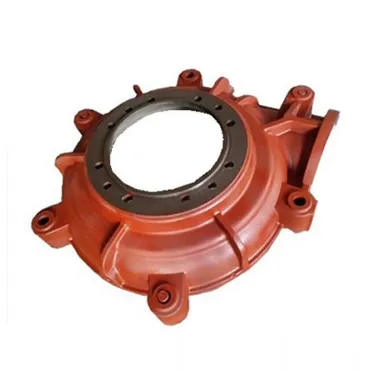Móvil:+86-311-808-126-83
Correo electrónico:info@ydcastings.com
Precision Flow Engineering Starts with the Right Pump Components
Fluid handling systems rely on more than just power—they demand precision, balance, and optimized internal dynamics to ensure smooth, efficient, and reliable operation. In the heart of every successful pump system lies a carefully engineered core, where each part must align perfectly to sustain performance across various pressures and conditions. When constructing or upgrading your pumping infrastructure, selecting the right components is critical for minimizing energy loss, reducing wear, and enhancing flow stability. From carefully cast structures to precision-machined impellers, every detail contributes to operational excellence.

Engineered for Endurance, the pump casing Protects and Directs Flow
In any fluid-moving mechanism, the pump casing plays a critical role in maintaining pressure and structural integrity. Embedded within its sturdy frame is the path that dictates fluid direction, velocity, and discharge efficiency. Far more than a container, the casing channels energy from the impeller into the delivery pipe while resisting internal stress from pressure fluctuations. Crafted from robust alloys or durable composites, a well-designed pump casing minimizes turbulence and extends the lifespan of the internal rotating elements. When chosen wisely, it also enhances heat dissipation, supports alignment, and reduces maintenance downtime over years of continuous use.
Optimize Flow Dynamics with a Precision volute casing
One of the most significant advancements in centrifugal pump design lies in the implementation of the volute casing, which converts kinetic energy from the rotating impeller into pressure energy with minimal loss. As fluid exits the impeller, the volute's expanding spiral geometry gradually reduces its velocity while guiding it toward the discharge nozzle. This process ensures pressure buildup occurs efficiently, supporting stable and high-performing output. By matching the volute dimensions to the impeller type and speed, engineers can minimize hydraulic shock and reduce operational noise. Investing in a precision-molded volute casing brings not just mechanical stability, but also measurable energy savings in long-term applications.
Unleash High-Speed Efficiency with a Balanced impeller for motor
The dynamic heart of any centrifugal pump lies in its impeller for motor, the rotating component responsible for imparting energy to the fluid. A well-balanced impeller ensures vibration-free operation and consistent fluid acceleration, making it ideal for systems requiring high precision. Material selection and blade geometry both influence how effectively the impeller transfers power from the motor to the liquid. Whether used in water circulation, chemical transfer, or process engineering, a high-quality impeller for motor enhances throughput while minimizing mechanical wear and cavitation risks. Modern impellers often include features like rear vanes or wear rings to improve flow patterns and prolong equipment life.
Elevate Pressure Handling with an Aerodynamic impeller turbo
For demanding industrial environments or high-flow applications, the impeller turbo offers advanced fluid acceleration, designed to handle aggressive flow rates and elevated pressures. Unlike standard impellers, turbo variants typically incorporate multi-blade, aerodynamic profiles that efficiently compress and direct liquid or gas across stages. By harnessing centrifugal force more effectively, these impellers reduce energy consumption per gallon moved. Furthermore, they provide consistent output even under fluctuating loads, making them a reliable solution in high-capacity systems like HVAC units, firefighting equipment, or marine propulsion setups. Integrating an impeller turbo into your pumping unit can yield smoother performance and greater fuel or energy efficiency.
Ensure Structural Integrity with a Reinforced pump body
Central to the durability of any fluid transfer system is a robust pump body, which anchors internal components and endures constant exposure to corrosive substances and mechanical pressure. The body must resist chemical erosion, accommodate varying thermal expansions, and remain dimensionally stable under stress. High-performance pump bodies are engineered for not only mechanical protection but also for ease of installation and maintenance. Multiple access points, reinforced flanges, and integrated cooling or drainage channels elevate functionality. Selecting a premium pump body improves operational safety and reduces failure rates, even in harsh or demanding environments.
How does a high-quality impeller for motor impact pump performance?
An efficient impeller for motor minimizes vibration, improves fluid acceleration, and ensures longer lifespan for both the motor and the pump. It translates motor energy into fluid movement with minimal losses, resulting in enhanced system efficiency and lower energy consumption.
Why is a precision-designed volute casing essential for pressure stability?
A well-designed volute casing converts velocity into pressure while guiding the fluid smoothly to the outlet. This transition minimizes turbulence and hydraulic losses, leading to quieter operation, lower power demand, and more consistent flow characteristics across various conditions.
Pump System Components FAQs
Q: What material is best for a durable pump casing?
A: Stainless steel, ductile iron, and specialized composites are commonly used for their strength and corrosion resistance, depending on the fluid type and operating pressure.
Q: Can a volute casing be replaced independently?
A: Yes, but it must match the impeller and pump body dimensions precisely to maintain flow efficiency and pressure control.
Q: Is it worth upgrading to a high-efficiency impeller turbo?
A: Absolutely. In high-demand systems, a turbo impeller can significantly reduce energy costs while boosting flow output and pressure control.
Q: How often should the pump body be inspected?
A: For industrial use, a thorough inspection every six months is recommended, especially in corrosive or high-pressure environments, to ensure integrity and prevent leaks or failures.
Q: Do all pumps use the same type of impeller for motor?
A: No, impeller design varies based on application. Closed, semi-open, and open types exist, each suited to different fluid characteristics and performance requirements.
-
Materials Used in Manufacturing Cap End Pipe FittingsNoticiasNov.24,2025
-
Material Properties of CF8M CastingNoticiasNov.24,2025
-
How to Inspect Pump Cap Ends for DamageNoticiasNov.21,2025
-
Backward Curved Impeller – Efficient Airflow Solutions for Industry | YD CastingsNoticiasNov.21,2025
-
Automobile Water Pump - Efficient, Quiet, Durable & ElectricNoticiasNov.21,2025
-
Impeller for Pumps – High-Efficiency, Durable, OEM-ReadyNoticiasNov.21,2025











